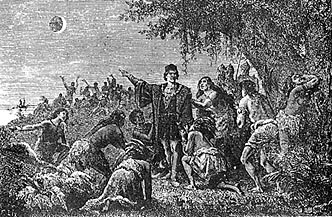
|
The
Sun-Eating Dragon
Continued
In the past 200 years, a
recurring theme in European eclipse stories involves western "scientific"
man taking advantage of the "superstitious" fear inspired
by eclipses to manipulate indigenous peoples. In one of the earliest
examples of this recurring story, Christopher Columbus, on his voyage
attempting to discover a western passage to the Indies, is stranded
in Jamaica, where he and his crew have stopped to gather supplies.
The local people are unwilling to provide the food and supplies
Columbus demands, and his crew is growing hungry and restless.

Stuck in this
awkward position, Columbus (it is said) hits on an ingenious solution:
from his astrological charts, he knows that a total lunar eclipse
will happen in a few days. When the day arrives, he gathers the
local people, tells them that he is very angry with them for withholding
supplies, and that he will show his wrath by causing the moon to
disappear. As if on cue, the moon begins to fade away behind the
shadow of the earth. The local people are struck with terror, and
they offer Columbus whatever he wishes, if only he will return the
moon to its place in the sky. Columbus relents, the moon reappears
in a few minutes, and Columbus and his crew are lavishly resupplied
and sent on their way by the grateful Jamaicans.
Though this
story may well be apocryphal, it provided the model for literary
eclipses for years to come. Mark Twain, in his book
A Connecticut
Yankee in King Arthur's Court
, has his main character, Hank
Morgan, use a similar gambit. Morgan is about to be burned at the
stake, so he "predicts" a solar eclipse he knows will
occur, claiming power over the sun, and offering to return the sun
to the sky in return for his freedom. "The rim of black spread
slowly into the sun's disk. . . . The multitude groaned with horror
to feel the cold uncanny night breezes . . . and see the stars come
out. . . ." Morgan is set free, and held in extreme awe for
his "wizardry."
|

